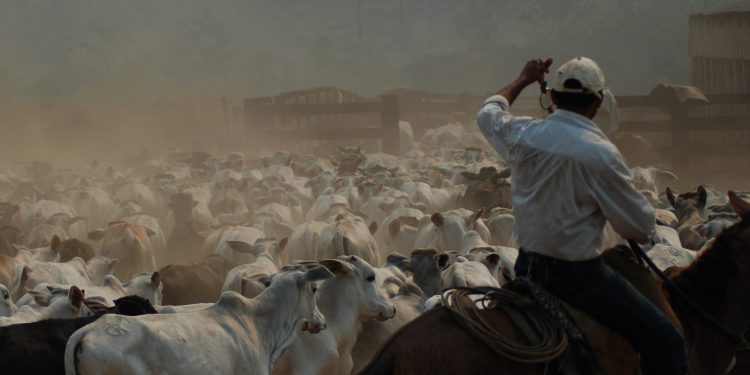Meatpackers face insufficient market pressure to invest in better traceability or sustainability, according to a new report.
The Repórter Brasil investigation, produced with activist group Mighty Earth, confirms that meat exporters continue to source from suppliers associated with human rights violations and illegal deforestation.
Problematic cattle are coming from the Amazon as well as other important Brazilian ecosystems such as Cerrado and Pantanal, it said.
Amazon rainforest loss between August 2020 and July 2021 was the highest in a decade and cattle ranching is the single largest driver of deforestation globally.
The three largest Brazilian meatpacking companies – JBS, Marfrig and Minerva – also the main beef suppliers to the US and the EU, are connected to problematic supply chains.
“Some transfers are real, but others are bureaucratic illusions”
But the report says meatpackers could influence cattle production and decouple ranching from land conversion and human rights violations.
Many cattle raised in recently deforested areas are transferred for final fattening to properties with “clean records,” which, in turn, sell them to slaughterhouses.
Some transfers are real, but others are bureaucratic illusions which only occur on paper, to enable the slaughter of animals linked to illegal deforestation, invasion of indigenous land and the use of labour analogous to slavery. The fraudulent behaviour is known as cattle laundering.
This means meat is being slaughtered on properties hundreds or thousands of kilometres from deforested areas – where it was born or grazed – masking its illegal origins.
In turn, retailers and manufacturers have a critical role to play in exerting market pressure on meatpackers, as consumers increasingly demand sustainable and ethical meat.
“62 per cent don’t trust supermarkets over deforestation”
A survey by YouGov and Mighty Earth found 87 per cent of UK customers would not like their supermarket to do business with companies that are driving destruction of the Amazon.
However, 62 per cent said they did not trust supermarkets in dealing with deforestation. The trend was repeated in France, Germany and the Netherlands.
In March this year a coalition of civil society organisations based in Brazil and France filed a lawsuit against retail group Casino, accused of selling meat linked to illegal deforestation and encroaching on indigenous areas in the Amazon. Casino controls supermarkets in Europe, Latin America, Africa and the Middle East. It is also one of the largest retail groups operating in Brazil.
The report recommends a supply chain management system to screen all transactions with ranches for labour, indigenous land and deforestation protection.
It also recommends a shift in investment toward business models aligned with the Paris Agreement goal to limit global tem-peratures to 1.5 degrees Celsius.
This includes measuring the impact of livestock in emissions production, and increasing investment in regenerative agriculture and farming, and in the production of alternative proteins.
- Some retailers named in the report responded by vowing to work harder at removing the tainted products from their supply chains.























